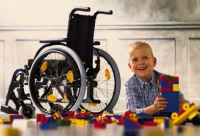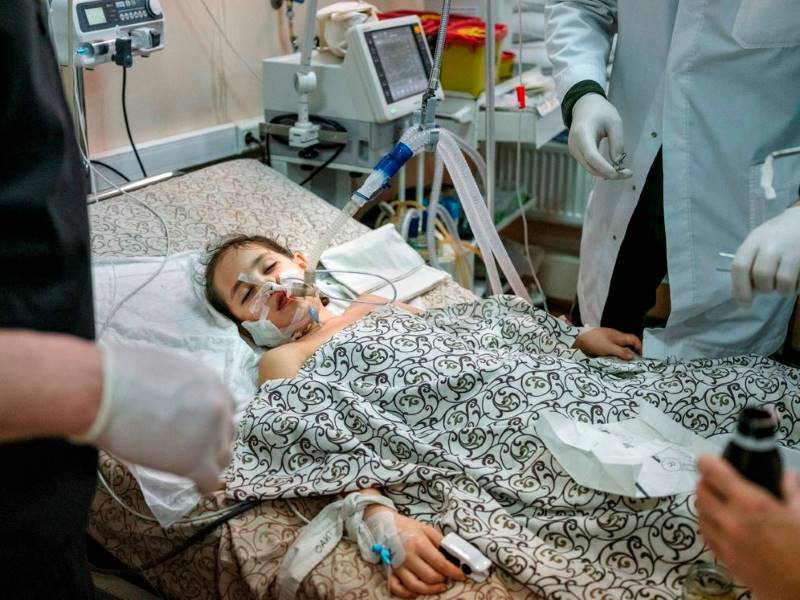The Hebron IT Academy, an educational institution, has been operating near Lviv for five years now, where orphans and young people who find themselves in difficult life circumstances study programming in two years. After graduating from the academy, they can become front-end, back-end, full-stack developers, game developers, or testers. In an interview with DOU, Orest Yatskulyak, a mentor for the educational part, told how the academy appeared and how training is organized. And two students shared their experiences of living here.
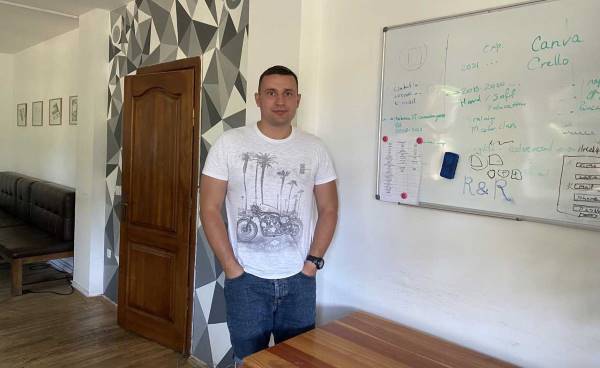
Orest Yatskulyak
How came to be Hebron IT Academy
Hebron IT Academy has been operating since 2016 in the village of Bryukhovichi near Lviv. Now orphans are studying here, as well as those whose families find themselves in a difficult financial situation or difficult life circumstances. They undergo two-year training at the academy, and then work for an IT company. Next year, they want to take girls here, because the request from them is even greater than from the guys. To get things done conceiveda separate home and leadership team so as do not mix students. It is planned to invite four.
The idea to create Hebron IT Academy belongs to the spouses Igor Bula and Lilia Valigun. They lived in the States for nine years. Lilia is a translator by education. For about two years she worked as a freelance engineer with Big Data Analytic, then was the CEO of CinemaWelcome - the first social network of online cinemas. Igor previously worked in the police force, then became a co-owner and product manager at CinemaWelcome. The spouses have always been partial to social projects and helped orphans.
Upon their return in 2015, Igor and Lilia decided to continue their social work. At first, they just raised money for children in need, but then they decided to take everything to another level. We realized that it is better not just to give funds, but to teach young people, to give them a profession. Therefore, Hebron IT Academy emerged on the basis of the IT company HebronSoft they founded (the company develops software and works with a blockchain platform, with offices in Ukraine, Canada and the USA - ed.). Part of the money earned from HebronSoft projects goes to the academy. The company also helps teachers, provides students with places for practice, as well as hires the most successful graduates.
The house in Bryukhovichi is both a house where students of Hebron IT Academy live and an educational institution. There is a large fenced private area, a sports ground, a gym, a kitchen, bedrooms, classrooms, classes, administration offices. This is the Hebron IT Academy center. A second house is located several streets away. It is rented for graduates who have not yet found a job or found a job, but believe that they are not yet ready to leave the academy yet - they need more time to adapt.
To launch the institution, Lilia and Igor hired an academic director and leader of the house. The first developed a curriculum that included programming, mathematics, English and circuitry. The second kept order in the house, was a mentor for the guys. In the first year, six students came to study, in two years - there was already a set of 16 people. In total, as of today, 30 students have passed through the academy.

The house where Hebron IT Academy students live and study
Orest Yatskulyak: "If a student is ready not to give up and step over his" I can not "- this is a sign that he can be in the academy"
Students at Hebron IT Academy are searched for through summer camps that we run on our own. A company of volunteers, social workers, management of orphanages, boarding schools and through churches throughout Ukraine talks about the camp that takes place near Lviv every year. More than fifty people come. In the camp, the guys communicate, solve logic problems, learn the basics of programming. And those who show the greatest talent, interest, those who have a desire to learn in their eyes, we take to the academy. There are always more applications than we can accept. And today there are so many contacts that we managed to recruit students even without camps - we have not been arranging them for the last two years because of the pandemic. Sometimes they even call in the middle of the year and ask to take them to me, they say, I'm wandering, I can't give myself advice, but I've heard about you, help me. Therefore, sometimes we make exceptions and invite not at the beginning of the school year in September, but when asked. If we were recruiting a hundred people, perhaps more efforts would have to be made to search. But we are limited in places and taking 12-15 students is not a problem.
They don't demand anything special from the guys. First of all, they must be of legal age. This is, firstly, connected with the legislation - there is much less bureaucracy if you work with those who are over 18. For children, you need to draw up other documents, and this is more difficult. Secondly, it makes no sense to take those who are 12 years old - they are still small and do not know exactly what they want. Thirdly, if you work with those who are 16-17 years old, more mature and understand their desires, abilities, in a year or two you will have to re-register all the documents, because they will become adults. To avoid such nuances, we decided to take people over 18 years old. To enter, they must provide identity documents, undergo a physical examination and an intellectual test to determine the level of knowledge and ability. Usually we give a task for logic. In fact, you can immediately see if a person is interested. Even if not a mathematical mindset, does not think in algorithms, but assiduous, ready to make efforts, we invite you to our place. There may not even be motivation at the start, however, if a student is ready not to give up and overstep his "cannot" - this is a sign that he can be in the academy.
Not everyone is trained to the end. For example, some people cannot overpower themselves and learn something, so they abandon their studies and want to leave. There were only a few such cases, but they do happen. We do not leave students who leave to fend for themselves. We are trying to find work for them in other places, to help with housing. Sometimes we get a job with entrepreneurs with whom we cooperate for simple physical work. Some of them, by acquaintance, go to live with graduates who already have a job in IT. Having lived with them, they get new inspiration, motivation, see how their life can turn out, and return.

Classes at the academy
Education and life of the academy
At the start, Hebron IT Academy taught general subjects like mathematics. Now they are more focused on programming and practical tasks. Such pairs are led by practicing teachers - these are people from senior IT companies or at least Strong Middle level. They do not waste time on theory, but give problems close to reality. They come to teach from HebronSoft, Sombra, there are just specialists from the market.
Also based on English. We involve university graduates for teaching, so there are no problems with a foreign language at all.
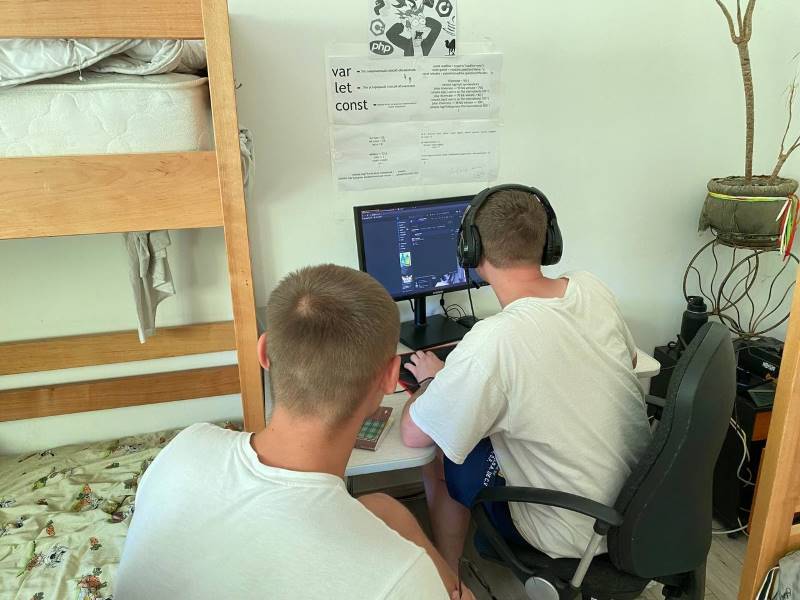
Students room
Some of the teachers are charged hourly, some are charged for the lecture. Everything is individual: how much do they rate themselves, we pay so much. There are teachers who make discounts, especially if the educational process can be organized online. The most expensive teacher gets $ 15-17 per hour. But on average - 150 hryvnia. There are those who read a whole course in their subject, and this is three weeks, for free.
The guys study from September to summer. In addition to subjects, the program includes sports. First of all, for back health, because they have to sit at computers a lot. We also play football, practice on horizontal bars, teach wrestling with those who had previous experience. I also read motivational lectures for them, those that help them tune in to their studies and organize their work correctly - about the same time management. We give educational and motivational books, arrange master classes, excursions.
The abilities of all who come are different. Some can complete the program in a year, while others find it more difficult. Students, ahead of training, get a job earlier. However, IT is not only hard skills, but also soft skills. 85% of people who come to us do not have interpersonal skills. Therefore, in fact, the program includes not only technical subjects, but also excursions - this helps the children adapt in society, because it is difficult for them. There is a cultural program: we take them to the opera house, arrange excursions around the city.
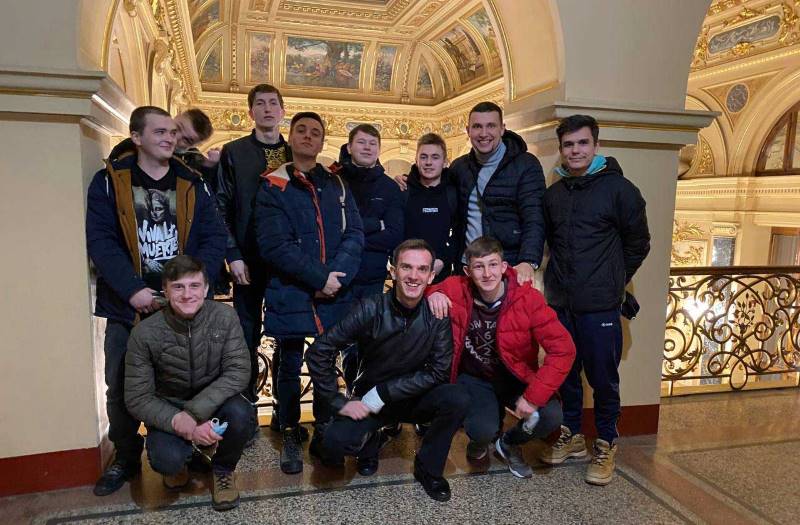
Excursion for students
And there is a more practical one - we agree with IT companies or industries so that they can see how people communicate with each other, how work is generally arranged in an office or at an enterprise. People come to us after living in a boarding school, after years of wandering in the streets, after using drugs and stealing. And then suddenly a person enters the IT world. This is communication, corporate culture. It's harder for them to understand and internalize than algorithms. Therefore, training for two years - purely technically, we can prepare the guys in 6-7 months, in another 3-4 months of practice they will become good juniors. But in the learning process, we find many problem points that are worth working out, because if a person is not socialized, he will simply be kicked out of the company, because he will interfere with the project.
If the case is difficult, psychologists are involved to help work through the trauma. In general, we educate everyone on the principles of Christian morality. This is not a religious teaching. Just a list of principles that we explain will help solve practical problems. Even at the level of everyday life, there are many nuances: who ate someone's portion, who took someone else's sneakers, someone likes to "hand over" someone. And it doesn't work here that the leader in the house says: "You can't do that, I said." You need to refer to more fundamental things.
By the way, earlier the leaders of the house tried to create a family atmosphere here. The leader was like a father: above the hierarchy, strict, but ready to give advice. And yet we have moved away from this practice. We will not replace families for children. And in many different representations of what it is in general. Expectations are too high and this gives rise to conflicts. Someone thinks that the father is strict, but never scolds, someone presents him differently. Therefore, we came to the conclusion that the best formula is to be a friend, a mentor who does not just say how to do it correctly, but demonstrates everything by example.
The guys clean the house themselves - they are on duty. But the cleaning lady still comes twice a week, because they can miss certain moments, and cleanliness must be maintained. Previously, when there were few students, everyone cooked for himself. But now they have hired a cook, since it is more convenient to do it centrally.
The biggest expenses are accommodation and teachers. Providing a home, food, laptop, programs for one student is 7-8 thousand hryvnia per month. Plus - a scholarship of one thousand hryvnia for each. It is not always possible to collect such a sum, but nevertheless, we provide basic supplies with everything necessary. If we have collected less money, we can buy other products or courses to save a little. Because if a person is hungry, he will not study. Financial help is provided by entrepreneurs, lawyers and other people who know about us. We also won a grant from the Lviv Educational Foundation for the second time and are gradually establishing fundraising. Before the pandemic, charity auctions were organized: people came to us, got acquainted with the academy, talked. But so far we do not do this, until it all comes down to personal donations. In the future, we hope to revive the practice of auctions.

Sports ground on the territory of Hebron IT Academy
Development of activities
30 students have already graduated from Hebron IT Academy. Of the graduates, only a few people did not get a job in IT. Our guys work for SoftServe, Sombra, HebronSoft and other large companies. Most remain in Lviv, but four went to Kiev. We do not oblige them to go to specific companies, but in Lviv it is easier to help with employment, because we are friends with the local IT cluster.
Upon completion, everyone receives a certificate. If necessary, we write recommendations. We encourage students to write resumes and interviews, because it's an experience even if you weren't hired right away.
Our goal is for 90% of teachers and leaders to be from our graduates. After all, they will inspire by their example, it is easier for them than for people from outside who did not have a similar life to communicate with students. But this takes time - they must not only find a job, but grow as specialists. Therefore, we are waiting. We maintain contacts with everyone. And graduates often come to our meetings - they do not want to cut ties.
Alexey Lebedik, 25 years old: "In the academy, a lot depends on self-education and self-discipline"
I am from Krivoy Rog, from a large family. I got to the academy by chance: an acquaintance studied here, told me, asked the management if I could come, and they took me. Now I have studied here for three months and should soon start a project - create websites for a Canadian customer.

I used to work as a builder. Twice I went to work in Poland, once I was in Hungary. But I didn't like it. I am hardworking when I see perspective. And when at a construction site they tell you that you can count on an additional 100 hryvnia, this is a dubious prospect. You walk dirty, you work in such a way that you cannot straighten up. You don't earn anything, you don't have time for friends, family. Perhaps there is a type of people who calm down when they work at a construction site or a factory, but I am not like that. In the end, it got to the point where I lost faith in myself. I even thought to return to Europe, because sitting on the neck of my parents at my age is not good. But still I managed to come to an agreement with myself and find what I was interested in.
I have always had a mathematical mindset, so it was not difficult to study. In the academy, a lot depends on self-education and self-discipline. The big plus is that everyone learns. It was difficult for me at home: you come after work, there is no desire to teach, someone is constantly distracting. Here, our group of four lives in one room. We sit down to study and begin: and you know how to do it, and how it is, but let's go, who is faster. Learning is easier because you are isolated. Even when you want to rest, it won't take long. You can watch a movie, TV series, play games, but you don't want to do this for a long time. If you get confused, lag behind others, you fall into a depressive state because of this.
We have a daily routine: getting up, lunch, sports, time for books. All this is monitored, checked, we read. Lots of English checking. You may not read the book, but don't learn english - will fail.
The guys are very different. There are many who are not adapted to standard things: it is difficult for them to wash a plate, clean up after themselves, cook. But everyone is good-natured and ready to learn.
Soon I will have a project. I will be a Full Stack Developer. But in general, I dream of creating my own game - there is already a concept in my head. I don’t know how it will turn out. But I want to stay here and help the academy. I hope there will be time for this, because the job is promised remotely. The main thing is that I have a goal and I know why I am doing it.
Dima Korishko, 20 years old: "Everything works like in Europe"
I am from a large family. I was born in Volyn, and I got here across my orphan friend - we studied together to become auto mechanics. When he entered Hebron IT Academy, he told me about his impressions, was glad that he got here, because he is the kind of person who sits at the computer around the clock - he likes it.

Then I was 18 years old, I was thinking about what to do next. The older sister always said: it is better to work with the brain, not physically. And I agree with her: physical labor is not for me. Mental is another matter, especially since I am a believer and would like to share my knowledge with others, engage in mentoring. Therefore, I fired up to do the same and become an IT specialist. At first I thought of it as a chance to get a job that would provide me with. Everyone says: "Oh, IT guy, that means a lot of money." But then I realized: if a person puts money as the main goal, he will not go far, he will quickly burn out. And what is money? Today is, tomorrow is gone. In a word, I set a bar for myself: to use time not 100, but 120%, get a profession and help those who were in the same conditions as me.
We have different areas to master: backend, frontend, game development, testing. I like that they don't force me to learn everything like in school. You can choose the direction you like and develop in it. Everything works like in Europe: you study the subjects that you really need. Now I am taking a full stack course, but I understand that this is not mine. It's a little difficult, so I want to switch to testing - I really caught fire with this. I thought that if I strain, I can become a full stack, but time will pass and I will burn out. I will burn out, because I will teach not because I want to, but because I have to.
I have been at the academy for almost a year. I think now I will take up QA and next year I will be able to work on the project. But I'm not going to quit the institution. This place left an imprint on my life, gave hope and opportunities. Therefore, I will help them as much as I can.

